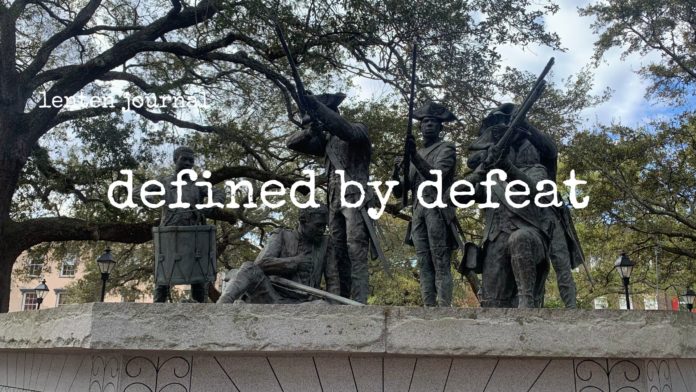I spent the better part of today walking with nowhere to go. It was a gift.I looked at houses, talked to dogs (and some people), found a bookstore, stopped for coffee, got lost without having to worry about it, read a bunch of historical markers, and saw a bunch of memorial statues.
The heart or the city of Savannah is built around squares–twenty-three of them. They are beautifully cared for parks with giant shade trees and benches. Each one is named after a man who was significant to the city in some fashion (and it was all men) and most of them had some sort of monument or memorial to another man; I couldn’t find much connection. The Pulaski monument, for example, was not in Pulaski Square.
The first one I came upon was a large granite platform that held five figures who represented the Chausseurs Volontaire de Saint-Domingues–the voluntary soldiers of St. Dominic–who were gens de coleurs (men of color) from what we know as Haiti. They came with the French to fight alongside the American colonists against the British, who held the city in the Revolutionary War. The battle was known as the Siege of Savannah in 1779. They were free men for the most part; some enslaved men volunteered as well with the promise of being freed after the battle.
But they lost. The combined forces suffered heavy casualties.
As I moved from square to square, I found other monuments that centered around the same battle: William Jasper, Casimir Pulaski (who both died in the battle), and John Oglethorpe, who lived. Again and again, I saw ways in which this town defines itself by defeat–that defeat in particular. The statue of William Jasper has him posing with his hand against the mortal wound in his side. Though he is still fighting, it is not a victorious posture. The cost of the siege was enormous: almost 250 soldiers killed, 600 wounded, and 120 taken prisoner.
The defeat was not the last word of the war, I know. But there are not a lot of places with monuments to the victory, perhaps because what happened here was such a profound loss.
I am not one who finds much value in war, or war as a metaphor, so I see a whole other rabbit to chase when it comes to finding our identity in conflict, but I was moved today by the imprint of defeat on our lives, both individually and collectively.
I have never lived in an active war zone. I read about what is happening in Ukraine, or think about what has gone on in Iraq or Afghanistan, and I don’t know how to really imagine it. I look at the number of casualties and imagine the palpable absence that hung in the air like Spanish moss after the siege ended.
In a couple of the parks, I sat and watched people interact with the monuments. Some stopped and read, others took pictures. Most walked by carrying food, following pets, of talking to a companion. Even the largest of them is diminished in scale by the giant oaks that surround them.
Later in the day, Ginger and I walked to Whitefield Square, built in 1851 to honor the minister George Whitefield who founded the oldest orphanage in America. The main reason we were there is the First Congregational Church sits on one side of the square. It was built in 1895 and it was a Black church. The center of the square holds a beautiful gazebo surrounded by azalea bushes. There are markers about Whitefield, but there are none that tell that land was a burial ground for enslaved people. Andrew Bryan, the founder of the First African Baptist Church is buried there. I could not find a marker.
The same white people who so intently defined themselves by defeat were not as quick to put up monuments to their conquest and oppression. Those whose graves were erased left a legacy that became the struggle for Civil Rights, which has been fed by an enduring defeat in its push for equity and beloved community: We shall overcome . . . someday.
Hope lies in trusting that defeat is not the last word. The white colonists in Savannah used the defeat to define themselves as people who were determined to gain their freedom, even as they blinded themselves to the myriad ways they were refusing freedom to and inflicting defeat on an almost equal number of the population.
How we are defined by our defeat is not an easy question to answer.
Peace,
Milton
